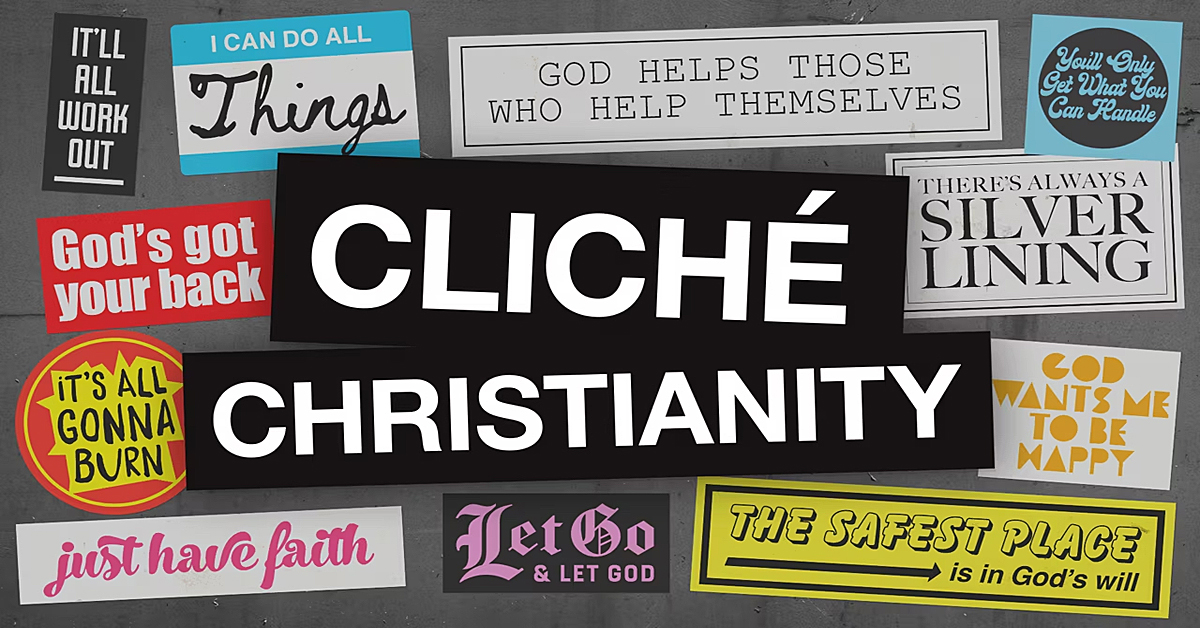Have you noticed how we humans are comforted by familiarity and intimidated by the unknown? Perhaps this explains why clichés come into such common use. Or perhaps we are simply lazy and prefer to use a trite statement rather than create something original.
The Christian life is filled with cliché. Christians are notorious for speaking “Christianese,” using words and phrases that have meaning within Christianity but little or no meaning outside. When speaking to a fellow Christian I can reference “Hosanna” or “Jehovah” and he would likely understand what I mean. To a person unfamiliar with Christianity these terms would have no significance.
As time passes, though, these words begin to lose meaning even for believers. There are many words we use and concepts we believe in that we have lost all meaning to us.
Perhaps we should investigate words we frequently use that may no longer evoke interest or any genuine meaning because they have been so overused. As the original meaning of the word “trite,” a synonym for “cliché” indicates, they have become frayed and worn out by constant use.
A cliché is often used when a speaker (or writer) cannot think of an original way to express an idea. It may also be that there is no easy way to present the idea other than to use a cliché. The danger of never investigating such words and discerning their true meaning is that eventually they become little more than tradition.
As Christians we are told not to use “vain repetitions” but perhaps that is what many of these phrases have become. What does the word “amen” really mean to us, other than “let’s all open our eyes now?” Is it not proper for us to give serious thought to the words we use? I wonder how it would impact believers if we really understood the meaning and significance of phrases that have lost much of their meaning and significance.
What if we truly understood what we mean by “amen” when we mumble it at the end of our pastor’s prayer? Would we say it loud and clear as if to God Himself? Or perhaps we would be more hesitant to speak the word at all.
Let’s look at some definitions:
Cliché: A trite or overused expression or idea. A person or character whose behaviour is predictable or superficial.
Trite: Lacking power to evoke interest through overuse or repetition; hackneyed (overfamiliar through overuse). Archaic. Frayed or worn out by use.
I’m sure you can see how these definitions apply to some of the words you use. You may really have no idea of the meaning behind some of those words – it could be that you learned them in a Church context and may have been using them for years without really grasping what they mean. Or perhaps you have used the words so many times that you have lost sight of their meaning and significance, allowing them to become worn out.
Here are some clichéd expressions I hear all the time:
The word “amen.”
The phrase “Dear God.”
The word and concept of “forgiveness”.
The word and concept of “bless.”
The phrase “in Jesus’ name.”
The word and concept of “miracles.”
The word and concept of “sin.”
The word “worship.”
The word and concept of “the cross.”
The concept of “personal relationship.”
The word “gospel.”
I’m sure I could go on…and on. The point is that we often live a type of clichéd Christian life. We use clichéd words to worship a clichéd God. When we allow ourselves to only experience God on the basis of cliché, we will become as tired of Him as we are tired of the words we use to describe Him. But when we take the time to examine the words we use to speak to God and to speak about God, I believe we will allow God to be more real to our minds and to our hearts.
What are some clichéd words and expressions you use? How do you think it would change your relationship with God if you took the time to make those words real to you?

